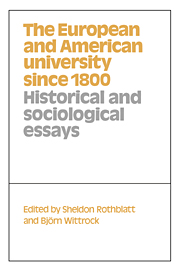Book contents
- Frontmatter
- Contents
- Notes on the contributors
- Introduction: universities and ‘higher education’
- Part I Fact and ideals in liberal education
- Part 2 The State, the university, and the professions
- Part 3 The ambiguities of university research in Sweden and the United States
- 5 Universities, research, and the transformation of the State in Sweden
- 6 Research, graduate education, and the ecology of American universities: an interpretive history
- Part 4 Complexity
- Part 5 The ironies of university history
- Index
6 - Research, graduate education, and the ecology of American universities: an interpretive history
Published online by Cambridge University Press: 04 August 2010
- Frontmatter
- Contents
- Notes on the contributors
- Introduction: universities and ‘higher education’
- Part I Fact and ideals in liberal education
- Part 2 The State, the university, and the professions
- Part 3 The ambiguities of university research in Sweden and the United States
- 5 Universities, research, and the transformation of the State in Sweden
- 6 Research, graduate education, and the ecology of American universities: an interpretive history
- Part 4 Complexity
- Part 5 The ironies of university history
- Index
Summary
The formative generation: the Civil War to 1890
A century ago American higher education was emerging from a generation of momentous changes. Much of what constitutes the American system of higher education today took shape and definition in the years between the outbreak of the Civil War and the last decade of the century. The landgrant colleges provided publicly maintained higher education across the entire country. Cornell University, among the earliest of the many major foundings of these years, showed that agriculture and the mechanic arts could be taught alongside the liberal arts and sciences. The elective system, effectively championed at Harvard by Charles Eliot (1869–1909), was clearly triumphant by the end of the 1880s. It unchained manifold possibilities concerning what could be learned in college and, just as importantly, what could be taught. Professional schools blossomed as expected components of forward-looking universities. Within the arts and sciences, the disciplines took their modern forms by organising into professional disciplinary associations. The nature of college-going was transformed as well between the end of the Civil War and 1890. Higher education for women attained parity with that of men, whether in separate colleges or in co-educational settings. Students generally shed the compulsory piety and discipline of the Antebellum colleges, and instead elaborated an extr acurriculum of their own devising, not the least of their innovations being American football.
Perhaps overshadowing all these changes was the long-awaited establishment of graduate education and research within American higher education. In the half-century before 1860, Richard Storr has written, ‘the need, as distinct from the demand, for graduate education had been declared loudly and repeatedly’.
- Type
- Chapter
- Information
- The European and American University since 1800 , pp. 234 - 260Publisher: Cambridge University PressPrint publication year: 1993
- 7
- Cited by



